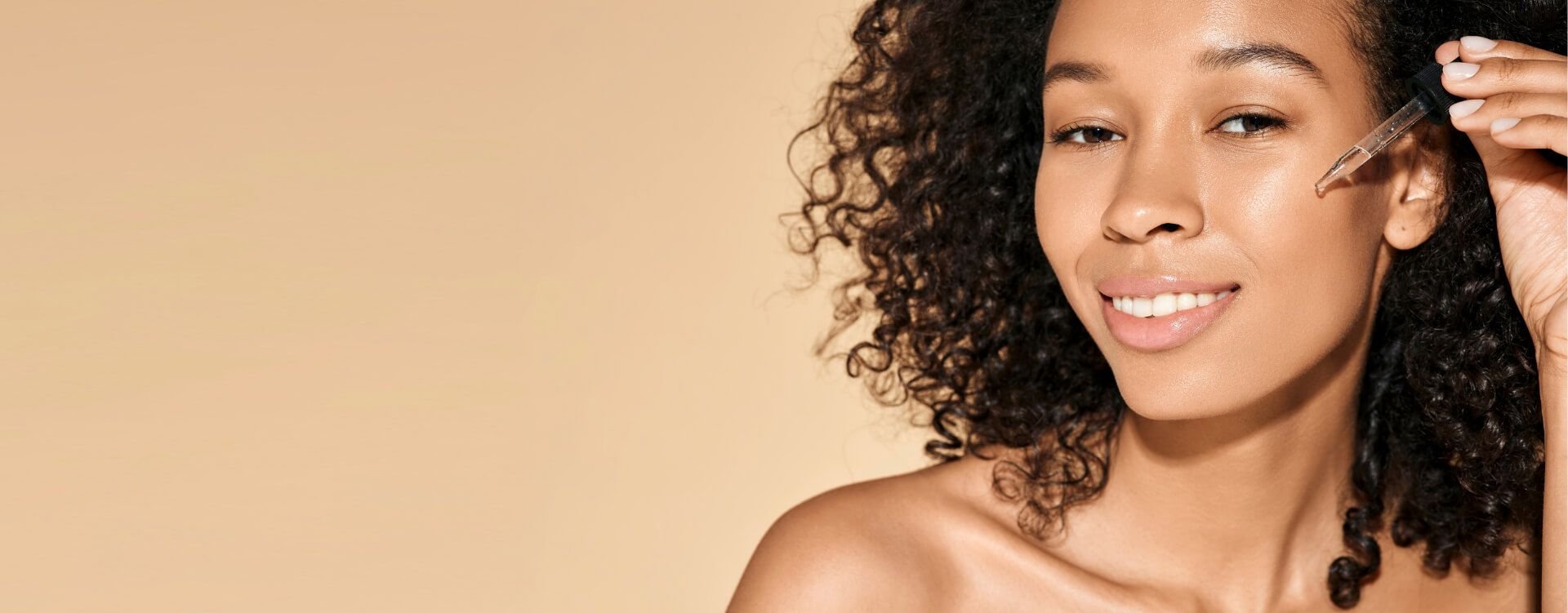Menu
Facial skincare products
It all starts with a true understanding of your skin, and here at our award-winning London clinic, it’s what we do. We tailor the very best skin care treatments to you, leaving your skin looking and feeling revitalised.
Skincare with integrity
During your consultation, we’ll take the time to better understand you and your skin. Whether you’re looking to address pigmentation or age spots, treat skin conditions such as melasma, acne or rosacea, tackle wrinkles and fine lines with anti-ageing treatments, or you’re simply wanting that all-year-round summer glow, our skincare experts will find the right skin care treatment for you.
Your skin will be in the hands of true experts. We know that when it comes to skin care treatments, a one size fits all approach simply doesn’t work. That’s why we have the largest selection of skin care treatments in the UK, including The Secret Skincare, Obagi and iS Clinical, used by our experienced skincare professionals here at our London skin clinic.
Skincare with integrity
During your consultation, we’ll take the time to better understand you and your skin. Whether you’re looking to address pigmentation or age spots, treat skin conditions such as melasma, acne or rosacea, tackle wrinkles and fine lines with anti-ageing treatments, or you’re simply wanting that all-year-round summer glow, our skincare experts will find the right skin care treatment for you.
Your skin will be in the hands of true experts. We know that when it comes to skin care treatments, a one size fits all approach simply doesn’t work. That’s why we have the largest selection of skin care treatments in the UK, including The Secret Skincare, Obagi and iS Clinical, used by our experienced skincare professionals here at our London skin clinic.
Before and after skin care treatments
Skin care treatment price list
Our skin care treatments
The Secret Skincare
The Secret Skincare is a prescription based skincare range. Each skincare product is tailored to your skin concern and made to order for you. Combining gold standard, evidence based ingredients, The Secret Skincare has a range of products to treat pigmentation and sun damage as well as rosacea, dermatitis, acne and general skin rejuvenation. It even has products suitable for pregnancy and breastfeeding.
Obagi
We use the Obagi Nu-Derm System, an effective skin care treatment that tackles hyperpigmentation, age spots, fine lines and wrinkles, a loss of elasticity in the skin, redness and a yellowish complexion. This innovative treatment works at cellular level to address signs of photo-damage and restore the healthy function of the skin cells.
iS Clinical
Our skincare specialists use the iS Prodigy Peel "P2" system that treats a large range of skin conditions, including mild acne, pigmentation concerns and signs of ageing. And, if you'd like to treat your skin at home, our specialists can create a bespoke skincare routine using the iS Clinical products. Each skincare product is specially formulated to treat a skin condition or symptom, upstaging off-the-shelf skincare products.
Our skin care treatments
The Secret Skincare
The Secret Skincare is a prescription based skincare range. Each skincare product is tailored to your skin concern and made to order for you. Combining gold standard, evidence based ingredients, The Secret Skincare has a range of products to treat pigmentation and sun damage as well as rosacea, dermatitis, acne and general skin rejuvenation. It even has products suitable for pregnancy and breastfeeding.
Obagi
We use the Obagi Nu-Derm System, an effective skin care treatment that tackles hyperpigmentation, age spots, fine lines and wrinkles, a loss of elasticity in the skin, redness and a yellowish complexion. This innovative treatment works at cellular level to address signs of photo-damage and restore the healthy function of the skin cells.
iS Clinical
Our skincare specialists use the iS Prodigy Peel "P2" system that treats a large range of skin conditions, including mild acne, pigmentation concerns and signs of ageing. And, if you'd like to treat your skin at home, our specialists can create a bespoke skincare routine using the iS Clinical products. Each skincare product is specially formulated to treat a skin condition or symptom, upstaging off-the-shelf skincare products.
We are the skincare experts, treating a whole host of skin concerns
Everyone who steps through our clinic door gets a bespoke skincare plan during their consultation. We treat a whole host of skin concerns, including:
Pigmentation issues. The skin, hair and eyes get their colour from a large group of molecules called melanin. Those with skin pigmentation issues either have an excess or lack of melanin which can affect the skin. Hyperpigmentation is where the skin appears darker in small or large areas of the body, most commonly causing melasma, age spots and post-inflammatory hyperpigmentation.
Age spots. Age spots appear on sun-damaged skin and are also known as sunspots, liver spots and solar lentigines. The symptoms vary, but age spots are usually a tan to dark brown colour and appear on areas of the skin that have been exposed to the sun.
Acne. Commonly affecting the face, back and chest, acne is a skin condition that causes spots, oily skin and sometimes skin that is hot or painful to touch.
Rosacea. Rosacea is a skin condition that makes the skin look persistently red or flushed. Symptoms also include thickened skin, papules or pustules and visible blood vessels.
Fine lines and wrinkles. When the skin begins to age, fine lines can appear on the face. Fine lines tend to be mild as they are closer to the skin's surface, whilst wrinkles are deeper and more prominent.
Skincare for acne
Acne can really knock confidence. And whilst it’s most common among teenagers, it can affect people of all ages. A skin condition where oil and dead skin cells clog the hair follicles, whiteheads, blackheads and pimples can appear. This can really take its toll on those suffering with acne.
For severe cases, many rightly visit their doctor for prescription medicines and treatment. But for some, they turn to off-the-shelf or prescribed skin care treatments and products at clinics such as ours. As it’s so important to get skincare for acne right, we book a no obligation consultation to create a bespoke skincare plan. Our skincare specialists may advise that skincare products are the best for you. Or, they may recommend treatments such as AviClear. We’re the first clinic in the UK to provide this life-changing treatment, the first FDA-cleared energy device for mild, moderate and severe acne.
Your skincare practitioners
Safe and effective treatment
Your safety is our top priority and making our patients feel welcomed and reassured when entering PHI Clinic. To ensure maximum standard of patient care, all of our treatments are only ever carried out by our experienced and highly qualified team, who receive regular in-house and external training from industry experts.
At PHI Clinic we do not offer same day treatment as initial consultation to ensure patients have time to reflect on their bespoke treatment plan before choosing to proceed.
What is my skin type?
Before looking at the right skin care treatment, it’s important for us to understand whether you have normal, dry, oily, combination or sensitive skin. Once this has been determined during your consultation, our skin specialists will create a bespoke treatment plan for the best results.
How to treat normal skin?
If you have a normal skin type, your face is neither oily or dry so you can use most skincare products. Like with all skin types, you should cleanse your face twice a day. As you have a normal skin type, you don’t need to worry about an intensive moisturiser that tackles oily or dry skin. Instead, use a hydrating moisturiser (even better if it contains hyaluronic acid for extra hydration). If your moisturiser doesn’t contain SPF, make sure to always follow this step with an SPF to protect your skin from the sun.
How to treat dry skin on your face?
If you have dry skin, your skin may be flaky and sometimes itchy. When it comes to dry skin, you should avoid foaming cleansers as this can further dehydrate your skin. Instead, use a gentle cleanser to reinvigorate your face. And whilst you’re in the bath or shower, make sure to limit the time spent (10 minutes max). Also, as warm water is kinder to the skin as it doesn’t strip the natural oils, make sure the water is not hot. When your face is cleansed, use a moisture-rich moisturiser before adding your SPF.
If you’d like to learn more about treating dry skin on your face, our skin specialists can help. To rejuvenate the appearance of dull, tired skin, we’d use products that restore moisture. With a range of skin care treatments and products available, we’ll create a bespoke plan for you.
If you have very dry skin, it’s a good idea to speak with a doctor who may prescribe a cream or ointment to treat it. If your dry skin is causing itchiness, a lotion with hydrocortisone can help. If you see any signs of concern, we always recommend booking an appointment with your doctor.
How to treat oily skin?
When the skin has excess oils and congested pores, skin can appear greasy. Skincare routines can be overwhelming, especially when it comes to treating oily skin. But taking it back to basics, you should cleanse twice a day, moisturise and always finish your morning routine with an SPF. You may wish to add steps to further treat your skin, but this is a good place to start.
When choosing products for your skin, look out for ones that are ‘oil free’ and ‘noncomedogenic’ to avoid clogging your pores.
The best cleanser for you is a gentle and mild foaming face wash. If you get a strong face wash, this could negatively impact your skin.
You may think that as you have oily skin, it’s best to avoid moisturiser. But this certainly isn’t the case. It’s still really important to apply moisturiser to keep your skin hydrated, avoiding a dull and tired-looking complexion. A water-based moisturiser is the way to go. Always avoid heavy creams and stick to light moisturisers that’ll give you that glow without the unwanted shine. And if your moisturiser doesn’t contain SPF, always make sure to finish your morning routine with SPF.
Our skin specialists are experienced in creating bespoke treatment plans for oily skin, including the very best treatments and products. Book in for a non obligation consultation to see how we could transform your skin, changing your routine for the better.
If you’re worried about the severity of your oily skin, please always speak to your doctor.
How to treat combination skin?
If you have combination skin, areas of your face are oily, whilst other areas are dry. You may find that the oiliest parts of your face sits in the t-zone (forehead, nose and chin).
As your skin is both oily and dry, it’s difficult to know where to start. Even if you’re looking to tackle an oil T-zone, avoid products that will completely dry out your skin. Focus your attention on the drier areas of your skin and tailor your skincare routine around this. Opt for mild and hydrating products that will be calming to the skin, rather than drying out the oiliest parts of the face.
We offer a range of effective treatments and products which can be combined in a personalised plan that meets your unique needs. So if you’re struggling with combination skin, don’t hesitate to reach out to us for expert advice and guidance.
How to treat sensitive skin?
If you have sensitive skin, you may find that your skin reacts to certain products, causing it to dry out, sting, feel itchy or turn red. You may have experienced that no matter what you put on your skin, it reacts. And if you’re faced with an allergic reaction, severe inflammation or itchiness, the first step should be to call your doctor. But if you’re looking for how to treat sensitive skin with an effective skincare routine, this is the place.
When it comes to sensitive skin, often less is more. We suggest bringing it back to basics with a 3 step skincare routine: cleanse, moisturise and SPF. When choosing any product for your skincare routine, always check that it’s suitable for sensitive skin. Also, avoid showering, bathing and washing your face with hot water. Instead, use warm water.
Skincare frequently asked questions
Location
PHI Clinic
102 Harley Street,
London,
W1G 7JB,
United Kingdom
Tel: 02070345999
Opening Hours
Monday & Tuesday - 9:30am to 6:00pm
Wednesday & Thursday - 9:30am to 8:00pm
Friday - 9:30am to 5:00pm
Saturday - 11:30am to 12:30pm
Sunday - Closed
Opening times can change, if your appointment is outside of these times please contact the clinic for confirmation.


